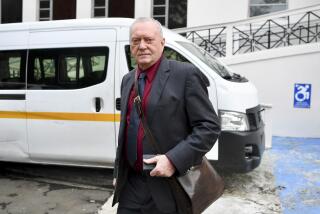Jury Acquits Bank Official in Moriarty Fraud Case
- Share via
A Los Angeles federal jury Monday acquitted former Orange County bank official Nelson Hallidy of conspiring with confessed political corruption figure W. Patrick Moriarty in an alleged money-laundering scheme.
The jury deadlocked on nine other charges accusing Hallidy of failing to comply with federal bank reporting rules.
The verdict stunned federal prosecutors and prompted a suggestion by Hallidy’s attorney that the government may have problems in its continuing investigation of political corruption because of Moriarty’s lack of credibility as a witness.
Seven Fraud Counts
Moriarty, who has pleaded guilty to seven counts of fraud as part of a plea-bargain agreement with the government, testified against Hallidy in a four-day trial that ended Friday, saying the former Bank of Irvine vice president had advised him on how to avoid Internal Revenue Service reporting regulations.
“They flat didn’t believe the man,” Byron McMillan, Halliday’s attorney, said of the jury’s verdict Monday afternoon. “I would love to defend anybody with Moriarty as a complaining witness.”
While the jury acquitted Hallidy of conspiring with Moriarty in the laundering scheme, jurors deadlocked after eight hours of deliberations on nine other counts accusing the 61-year-old banker of failing to comply with IRS reporting rules.
U.S. District Judge Edward Rafeedie declared a mistrial on the nine remaining charges and set an Aug. 6 hearing date to consider a government request for a retrial and a defense motion that Hallidy be acquitted on all charges.
Prosecutors Remain Quiet
Chief Assistant U.S. Atty. Richard E. Drooyan and Maurice L. Evans, an Orange County prosecutor working as a special federal prosecutor in the ongoing investigation of Moriarty’s affairs, had no comment on the jury verdict.
Hallidy was accused of helping Moriarty launder more than $317,000 in cash through the Bank of Irvine, which was closed by state banking officials in 1983. During Hallidy’s trial, Moriarty testified that by avoiding IRS reporting rules he hoped he could prevent the government from uncovering how he was using his money.
Moriarty, a wealthy Anaheim fireworks company owner, was originally indicted in connection with the operation of the California Commerce Club, a poker club in the City of Commerce. A subsequent investigation into his widespread political money-laundering activities has focused on several prominent politicians.
McMillan said he believed the jury verdict indicated that Moriarty’s testimony had backfired against the government, and that Moriarty’s plea-bargain arrangement made it look like Moriarty is now “corrupting the government of the United States.” Asked to explain his comment, McMillan said the jury obviously didn’t approve of the government prosecuting “a man like Hallidy” on the basis of information supplied by Moriarty in the hope of a light sentence in his own case.
Charles Williamson, 49, of Garden Grove, one juror who said he believed that Hallidy was guilty on all counts, confirmed that the jurors “simply didn’t believe” Moriarty’s testimony.
“Had he not been on the stand, maybe the evidence would have been enough,” Williamson said. “We actually felt Hallidy was a very dumb man, that he was a pawn.”
Williamson said that while jurors were deadlocked on the remaining nine counts of the indictment against Hallidy, the jury was heavily in favor of acquitting the former bank official. Only three jurors favored a guilty verdict, he said.
Speaking of the impression made by Moriarty during two days on the witness stand, Williamson added that most of the jurors felt that Moriarty was a “power-hungry man” who had simply used Hallidy.
Moriarty’s sentencing on seven mail fraud counts is now set for Aug. 26 but could be delayed by the continuing government investigation, in which he has promised to cooperate.
“I think once Moriarty is sentenced it might make a difference to a jury,” Williamson said. “In this trial, the impression was that he had made a deal with the government and he was going to get off scot-free.”
More to Read
Sign up for Essential California
The most important California stories and recommendations in your inbox every morning.
You may occasionally receive promotional content from the Los Angeles Times.













